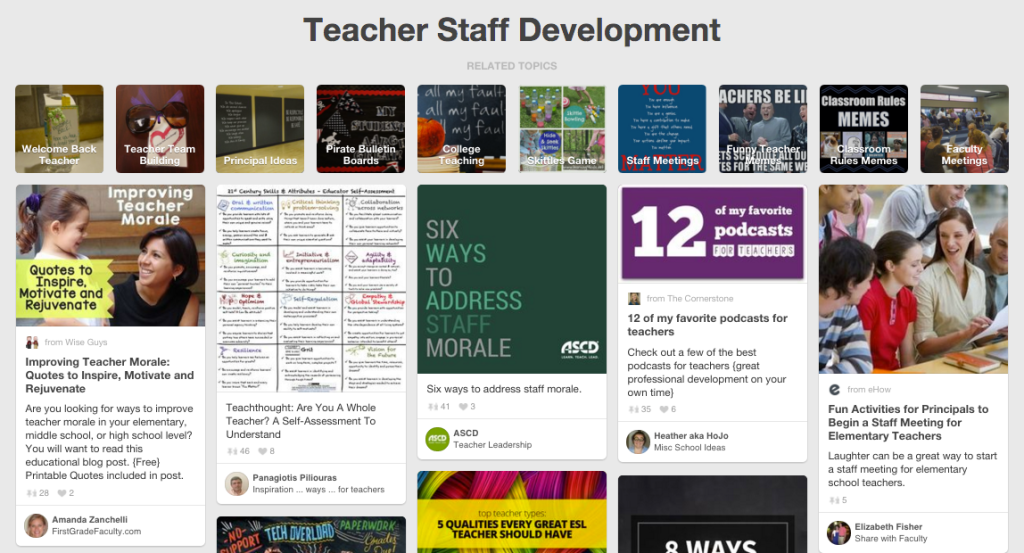8 Strategies for Educators to Spark Collaboration on Pinterest

Creative inspiration for educators isn’t all that Pinterest has to offer. Pinterest can be a robust collaborative tool for educators, helping to foster deeper ties both within the educator ranks and within the larger educational community.
1. Exchange lesson plans and ideas
At its most basic level, Pinterest is a great place to source top-notch materials for the classroom. Just who is offering up or curating those materials? Other teachers, of course. Whether they’re pinning their own materials from sites like Teachers Pay Teachers, or they’re simply sharing something they’ve found and love, Pinterest is collaborative even in its basic search premise. Find out about great reads, locate the best new tech resources, find the latest and greatest interventions, or source next week’s lesson plans.
2. Host pinning parties
If you’ve ever noticed a dramatic increase in pins in a short period of time, you might be witnessing a pinning party. The concept is simple. A group of teachers gets together at a designated time to pin as many resources as possible.
For teachers who are on Teachers Pay Teachers, this is a great way to get their work distributed widely while also helping their fellow teachers distribute their own work.
Outside of promotional purposes, treating this like an event will focus Pinners’ minds acutely (i.e. they’ll sit up and pay attention), so it’s a great way to disseminate material. You can arrange a pinning party with your online teaching friends, with your teaching team, or simply with other friends who are into education.
3. Request constructive feedback
If you’ve created a new lesson plan or worksheet and would love a second opinion or second set of eyes, pin it to Pinterest to receive feedback from your fellow teachers.
4. Find other teachers within your niche
Whether you’re a reading specialist with unique interests, a high school AP chemistry teacher, or a more general elementary school teacher who is interested in Montessori pedagogy, you’re sure to find your crowd on Pinterest.
Simply sit back and watch the on-point information come in, or reach out to those fellow teachers directly to pick their brains for more ideas. And if they have a blog, definitely make sure to follow it. They may be in the same school as you, or they may be located halfway across the globe. The whole world of teaching knowledge is open to you on Pinterest.
5. Contribute to collaborative boards
There’s no reason to make everything from scratch. With collaborative pin boards, teachers from around the world contribute relevant pins to create a rich resource library. For example, the A+ Collaborating Teachers board is curated by a group of over 70 teachers, who regularly pin the resources they find:

Why not make a Pinterest page for your team this year to which every teacher can contribute? This way you can support each other both online and in person by finding the best resources and exchanging tips that are relevant to the students you all personally know. These techniques aren’t just good crowdsourcing lesson ideas; they’re great for finding behavior management tips, too.
6. Participate in professional development
If you’re on Pinterest, you’re likely doing a good round of casual professional development. Some administrators make boards to help teachers develop throughout the year.
This teacher staff development board is a great example:

Here you’ll find a wide range of topics, all geared toward helping educators develop and stay on top of trends. Administrators might have teachers browse through one of these boards rather than require teachers to attend a professional development day.
7. Build projects together
Are you working on a project that requires close collaboration with team teachers? Then create a Pinterest board. This is an easy way for each team member to gather and contribute ideas in the brainstorming phase, and to find the many smaller parts that will become the larger project in the end.
8. Stay on top of trends
Just when you think you’re on top of one educational trend, there are hashtags trending on Twitter for pedagogies that sound more like made up words than any classroom technique you’ve ever heard of. Social media in general will keep you aware of these new trends, while Pinterest in particular will help you brush up on exactly what they mean.


